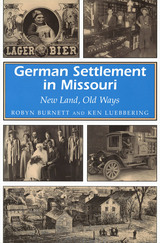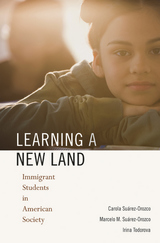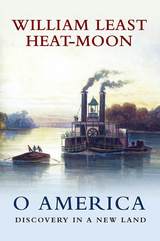
German immigrants came to America for two main reasons: to seek opportunities in the New World, and to avoid political and economic problems in Europe. In German Settlement in Missouri, Robyn Burnett and Ken Luebbering demonstrate the crucial role that the German immigrants and their descendants played in the settlement and development of Missouri's architectural, political, religious, economic, and social landscape. Relying heavily on unpublished memoirs, letters, diaries, and official records, the authors provide important new narratives and firsthand commentary from the immigrants themselves.
Between 1800 and 1919, more than 7 million people came to the United States from German-speaking lands. The German immigrants established towns as they moved up the Missouri River into the frontier, resuming their traditional ways as they settled. As a result, the culture of the frontier changed dramatically. The Germans farmed differently from their American neighbors. They started vineyards and wineries, published German-language newspapers, and entered Missouri politics.
The decades following the Civil War brought the golden age of German culture in the state. The populations of many small towns were entirely German, and traditions from the homeland thrived. German-language schools, publications, and church services were common. As the German businesses in St. Louis and other towns flourished, the immigrants and their descendants prospered. The loyalty of the Missouri Germans was tested in World War I, and the anti-immigrant sentiment during the war and the period of prohibition after it dealt serious blows to their culture. However, German traditions had already found their way into mainstream American life.
Informative and clearly written, German Settlement in Missouri will be of interest to all readers, especially those interested in ethnic history.

One child in five in America is the child of immigrants, and their numbers increase each year. Very few will return to the country they barely remember. Who are they, and what America do they know?
Based on an extraordinary interdisciplinary study that followed 400 newly arrived children from the Caribbean, China, Central America, and Mexico for five years, this book provides a compelling account of the lives, dreams, and frustrations of these youngest immigrants. Richly told portraits of high and low achievers are packed with unexpected ironies. When they arrive, most children are full of optimism and a respect for education. But poor neighborhoods and dull--often dangerous--schools can corrode hopes. The vast majority learn English--but it is the English of video games and the neighborhood, not that of standardized tests.
For some of these children, those heading off to college, America promises to be a land of dreams. These lucky ones have often benefited from caring mentors, supportive teachers, or savvy parents. For others, the first five years are marked by disappointments, frustrations, and disenchantment. How can we explain their varied academic journeys?
The children of immigrants, here to stay, are the future--and how they adapt will determine the nature of America in the twenty-first century.

Traveling by foot, horse, stage, canal boat, and steamer, Nathaniel and Nicodemus explore the backcountry and forge a deep friendship as they encounter a host of memorable characters who reveal the nature of the American experiment, one still in its early stages but already under the stress of social injustices and economic inequities.
READERS
Browse our collection.
PUBLISHERS
See BiblioVault's publisher services.
STUDENT SERVICES
Files for college accessibility offices.
UChicago Accessibility Resources
home | accessibility | search | about | contact us
BiblioVault ® 2001 - 2024
The University of Chicago Press









